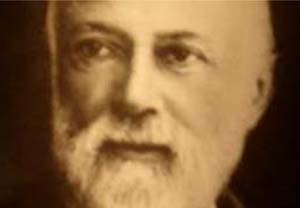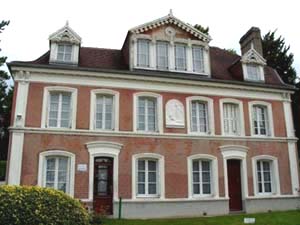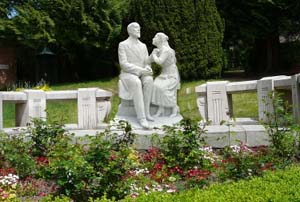Only a few hints of St. Thérèse of Lisieux’s profound suffering over the “trial” of her dear father, Louis Martin, appear in her autobiography The Story of A Soul. For example, shortly after the day she received her habit in January 1888, a “day of triumph” crowned with every happiness, she wrote:
“I did not foresee then the trial awaiting us. I did not know that on February 12, one month after my clothing day, our beloved father would drink so deeply of such a bitter chalice. … Words cannot express our grief; nor shall I attempt to describe it here. In Heaven, we shall enjoy dwelling on these dark days of exile. Yet the three years of my father's martyrdom seem to me the sweetest and most fruitful of our lives.” (Chap. VII)

Mr. Louis Martin |
Her words are so discrete that when I first read her autobiography, I had no idea what the “martyrdom” of Mr. Martin was. I did not realize that he was suffering from dementia and would be confined for three years in an asylum, a great humiliation and suffering for all the Martin family. The day Thérèse received her habit was his “day of triumph” because even though he was already becoming disoriented and suffering memory loss, on that day he returned to his 'old self' completely.
One year later on February 12, 1889 – the day Therese records in her diary – he was admitted to the Bon Sauveur (Good Savior) Asylum at Caen, 30 miles west of Lisieux.
An obsession for running away
Shortly after the entry of Therese at age 15 into the Lisieux Carmel on April 9, 1888, Louis told his daughters during a visit at the convent parlor: "My God, I am too happy. It’s not possible to go to Heaven like that. I want to suffer something for you." "And," he said, "I offered myself" (ibid.).
God accepted the generous offering of the family patriarch. After several strokes that year, Louis Martin began to suffer quite severe memory lapses, difficulty in speaking, fixations, unwarranted fears, periods of depression and exaltation, and desires to run away and hide. Causing great anxiety to the family, he would disappear from the house without telling anyone where he was going. Later, his condition was diagnosed as progressive vascular brain disease, an arteriosclerosis throughout his brain that evolved over a decade.
On one instance in June of 1988, M. Martin was missing for three days. Finally, on the fourth day, Celine received a note from her father posted from Le Havre (a port city 24 miles north of Lisieux) requesting money. She and her uncle left immediately and found him awaiting the funds near the General Post Office. When Celine asked him why he had gone, he answered, “I wanted to go and love God with all my heart!” Even in his confused mental state, he had the notion that, having given all his daughters to the religious life, he would now retire in solitude as a hermit.
A year later, Mr. Martin’s condition had worsened. His erratic behavior and obsession for running away had increased, and it became impossible for Celine and Leonie to care for him and keep a continual watch over him.
His brother-in-law, Isidore Guérin, who had assumed responsibility over the family, insisted he needed specialized care and constant supervision. So, M. Martin, age 65, the venerable patriarch of the Martin family, was committed to the Bon Sauveur mental asylum, ‘the madhouse,’ as it was crudely called in the area, where he became inmate no. 14449.
A patient at Bon Sauveur
How many Catholic families today with relatives suffering from senility would appreciate a hospital like Bon Sauveur, an old monastery transformed into a psychiatric hospital in the 19th century by the Congregation of the Daughters of the Good Savior. When Mr. Martin was admitted, more than 260 religious and novices cared for the men and women who were housed in separate complexes. Near the residence hall was a Chapel, where Mr. Martin spent much of his time and, when he was well, was allowed to receive Holy Communion.

The building for men at Bon Sauveur Asylum; below, the chapel where Mr. Martin spent much time
 |
After Mr. Martin was admitted, his daughters Celine and Leonie left Lisieux to live with the St. Vincent de Paul Sisters in Caen so they could visit their father daily. What a shock to see their father in the hospital uniform and at times forcibly confined to prevent his wandering. After the first visit, Celine wrote to her sisters, “Leonie and I said nothing. We were overwhelmed, shattered.”
After three months, the administration of the Bon Sauveur asylum reduced their visits to one a week. Was it too difficult for Mr. Martin, who was still often lucid and aware of his humiliating situation, to see his daughters daily? Or perhaps the Sisters realized the strain on the girls, whose health was clearly suffering.
Following the advice of their uncle, Celine and Leonie returned to Lisieux, where they would faithfully make the 30-mile journey to Caen each week to visit their father. Since the lease on Les Buisonnets, the family house, was set to expire in December, they left that blessed home and went to live in the estate of the Guérins. A chapter of happy memories in their lives closed.
These were difficult days for the Martin sisters, so often pictured as living idyllic rosy lives without great trials. In fact, the sufferings and humiliations were considerable. Celine and Leonie had to postpone their entrance into religious life; the family home was lost and the sisters became dependent on relatives; they had to face the harsh reality of their beloved father’s mental illness and bear the guilt of not being able to take care of him.
Finally, the whole family was keenly aware of the cruel gossip of friends and neighbors. Many people were saying that Mr. Martin had become sick because his daughters had abandoned him, especially his youngest, Therese. It was her entrance into Carmel, people said, that had caused his mind to fail. He would have been fine were he surrounded by family and grandchildren, the more malevolent gossipers continued, but his overly pious, selfish daughters had left him alone and now had committed him to a madhouse.
A gift, not a punishment
Neither Louis Martin nor his daughters viewed his illness with bitterness or anger toward God. Rather, they accepted this suffering as a great gift intended to refine and purify their souls.

The Martin home; below, a statue in its garden where Therese asked his permission to enter Carmel

|
His whole life, Louis Martin had set his first sights at pleasing God and following His will. Now in his trial he reaped the good fruit: He showed himself fully resigned to the will of God, even in face of what he admitted was “the greatest trial that could come upon a man.”
In his lucid moments, he felt the keen humiliation of his situation. Then he would generously renew his sacrifice and find God’s goodness in the great trial. “I have always been accustomed to being in charge,” he told a doctor, “and now I see myself reduced to obeying. But I know why the Good God has given me this trial: I have never had any humiliations in my life, and I need to have some.”
When Celine told him his family and friends, especially at Carmel, were praying for him to recover and return to Lisieux, he answered, “No, you must not ask for that, but only that God’s will be done.” One of the doctors told him one day that they would cure him, but he answered, “This trial is a mercy. I am here to atone for my pride. I deserve the illness that has struck me down!” The sister who witnessed the scene later told Celine, “We have never seen the like. We are caring for a saint.”
The Martin sisters viewed their father’s illness in the same supernatural light. Celine, who bore the greatest burden of responsibility in caring for him, would be overwhelmed at times by discouragement, but, writing to her sisters, she expressed her gratitude. “I want to be happy about our tribulations and to do even more: to thank God for the bitterness of our humiliations,” she wrote her sisters at Carmel. “I see something mysterious and divine in the conduct of Our Lord toward us! For did not He Himself pass through all humiliations?”
“In Heaven, we shall enjoy dwelling on these dark days of exile. I would not exchange them for the most sublime ecstasies, and my heart cries out in gratitude for such a priceless treasure,” Therese would later write in her autobiography, describing how she and her sisters understood their suffering in this period. “Precious and sweet was this bitter cross, and our hearts only breathed out sighs of grateful love. We no longer walked - we ran, we flew along the path of perfection.” (Chap. VII).
Part 2: Last Years of Monsieur Louis Martin

Posted September 24, 2010

Related Topics of Interest
 Everything Sublime Is Born from Sacrifice Everything Sublime Is Born from Sacrifice
 Styles Reflect the Moral Profile of Peoples and Epochs Styles Reflect the Moral Profile of Peoples and Epochs
 St. Therese of the Child Jesus: Master of Her Temperament St. Therese of the Child Jesus: Master of Her Temperament
 The Eyes and the Gaze The Eyes and the Gaze
 The Happiness of Waging a Holy War The Happiness of Waging a Holy War
 Visiting the Holy House of Loreto Visiting the Holy House of Loreto
 The Four Temperaments The Four Temperaments

Related Works of Interest
|
|